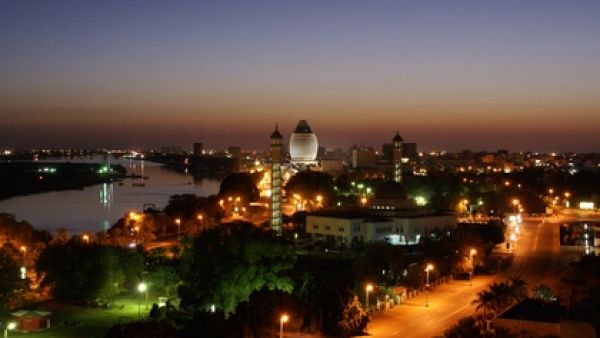- The U.S. is to lift its sanctions on Sudan after 20 years
- Many in the African nation are pleased at the decision following a period of economic hardship
- However, others see that internal problems as a greater issue
- Saudis have enthusiastically welcomed the decision, revealing the Gulf nation's growing ties with Sudan
by Rosie Alfatlawi
The U.S. will lift most of its economic and trade sanctions from Sudan after two decades, it was announced Friday.
An embargo was first imposed in 1997 after the African nation harbored extremists including Osama bin Laden.
U.S. State Department spokesperson, Heather Nauert, said the move followed 16 months of diplomatic efforts and was in recognition of Sudan’s “sustained positive efforts”.
These include progress on counter-terrorism, the pursuit of resolution in internal conflicts and a commitment not to “pursue an arms deal” with North Korea.
The Sudanese foreign ministry quickly welcomed the “positive decision”, which comes a week after Sudan was removed from the U.S. list of banned nationalities.
Many in Sudan, meanwhile, have taken to Twitter to express their joy at the decision, using hashtags #Sudan, #Sanctions_lifted_from_Sudan and #Friday_sanctions_lifted, which had received 60,000 tweets by Saturday, BBC Arabic reported.
#جمعه_رفع_العقوبات
— Salma Siddig (@salma99993) October 6, 2017
ياالله حقق لنا اليوم ماتمنيناه طويلا pic.twitter.com/z5kpWTZN8Q
God has achieved for us what we had hoped for a long time
When you are dead already but you see the hashtag #رفع_العقوبات_عن_السودان pic.twitter.com/ux6vMyAVgm
— •أنتوني• (@iTsAnToOnY) October 6, 2017
#رفع_العقوبات_عن_السودان
— Mutaz (@mutaz_mohd) October 6, 2017
Mood pic.twitter.com/oAy9Yz50Yt
@miss_smurfette6 wrote: Sudan’s exit from prison and entry into the free world. We’ve come a long way, homeland.
Sanctions of Sudan’s central bank have made access to global financial markets and hard currency difficult, leaving the country on the verge of economic collapse.
It was the poorest in Sudan who had suffered most from the sanctions, commenters described.
Perhaps surprisingly, the hashtags got their largest response from Saudi Arabia, where #Sanctions_lifted_from_Sudan was trending.
#رفع_العقوبات_عن_السودان
— (@r_ubz) October 7, 2017
On this hashtag u find how much saudis love Sudan
It is less strange, however, when you look at the politics of the matter.
In November 2015, Al-Monitor reported that Sudan had received $2.2 billion ($1 billion of that from Riyadh) for joining the Saudi-led campaign in Yemen.
In doing so, Sudan made a u-turn on years of courting Iran, which supports the Houthi rebels on the opposite side of the conflict.
Following Friday's decision, some Sudanese commenters even thanked Saudi Arabia for their support over the sanctions.
Sudanese public health specialist Dr. Isam Baloul:
#رفع_العقوبات_عن_السودان
— Dr. Isam Baloul (@Isambaloul) October 6, 2017
شكرا لكل من ساند السودان وخاصة حكومة المملكة العربية السعودية وخادم الحرمين الملك سلمان وشرفاء العالم اجمع
Thank you to all those who supported the Sudan, especially the Government of Saudi Arabia, the Custodian of the Two Holy Mosques King Salman and all the noble people of the world.
A Saudi tweeted:
سنوات و #السودان تبحر عكس التيار، وعندما عادت الى حضن العروبة وقفنا معها واليوم يتم #رفع_العقوبات_عن_السودان ولله الحمد
— بن ه (@5a1di) October 6, 2017
For years Sudan has been sailing backwards, and when it returned to the bosom of Arabism, we stood with them and today the sanctions were lifted against Sudan, thank God.
In fact, commentators have suggested that Saudi Arabia’s sudden interest in Sudan is an indication of their desire to unite the Sunni-majority nations of the Arab region against foe Iran.
There was plenty of enthusiasm, then, inside Sudan and further abroad for the long-anticipated decision.
Still, others in Sudan suggested, U.S. sanctions had been too easy a scapegoat upon which to pile the blame for Sudanese suffering.
High inflation, youth unemployment and widespread poverty cannot all be placed at the door of the embargo, some on Twitter indicated.
#رفع_العِقوبات_عن_السودان#رفع_الحصار_عن_السودان #رفع_الحظر_عن_السودان pic.twitter.com/zDpApWl2Bn
— سوداني وافتخر (@attoga2011) October 7, 2017
The cartoon shows the broken "clothes rack" of American sanctions, with the man asking where he will hang "Sudan's problems" now.
فك الحظر عن السودان ليس عصا موسى السحرية التي سوف تغير الوضع الاقتصادي في السودان. #رفع_الحصار_عن_السودان #رفع_العِقوبات_عن_السودان
— monzir muawia (@monzir_moawia) October 7, 2017
Undoing the embargo on Sudan is not the magic wand that will change the economic situation.
الحمدلله شماعةالعقوبات انتهت وياريت نرى تغييرحقيقي فى كل شى اولها وقف الحروب و توظيف من يخدم المصلحه العامه وليس الحزبية#جمعه_رفع_العقوبات
— Rabea Ali (@Rabeea266) October 6, 2017
Thank God, the "clothes rack" [see cartoon above] of sanctions is over, and I hope we see real change in everything. The first step is to stop the wars and to recruit those who serve the public interest and not the party's [interests]
The same Twitter user added: “For us, the sanctions are imposed on us from inside [Sudan] not from outside, for that reason we must liberate the internal first of all.”
In fact, some human rights groups have criticized the move. The U.S. continues to designate Sudan a sponsor of terrorism, while President Omar al-Bashir faces genocide charges at the ICC.
Lifting the sanctions “sends the wrong message”, Andrew Prasow of Human Rights Watch told Reuters, as Sudan has “made so little progress on human rights”.
Maddy Crowther, of “Waging Peace”, tweeted:
My comment on #Sudan sanctions verdict in @FT https://t.co/fD9zvOJfDi Focus on offensive military activity, not civilian safety, wrongheaded
— Maddy Crowther (@CrowtherMaddy) October 6, 2017
Others in Sudan were worried that the lifting of sanctions would mean that their state will make political concessions to America. Under a "five-track plan", Khartoum had to meet a number of conditions before the restrictions could be lifted.
#جمعه_رفع_العقوبات
— Hambatti (@hambatti) October 6, 2017
عشرون سنة من السير عكس الاتجاه كلفت الشعب افقارا علي افقار واثرت علي كل القطاعات الحيوية . مابين الانكار التام لاثر المقاطعة وصولا لتنازلات مؤلمة لاجل رفع العقوبات
Twenty years of heading in the opposite direction has cost the people impoverishment on top of impoverishment, and affected all vital sectors. From total denial of the boycott arriving at painful concessions in order to lift sanctions.
#رفع_العقوبات_عن_السودان
— •أنتوني• (@iTsAnToOnY) October 7, 2017
2016 : Sudan
2017 : United States of Sudan







